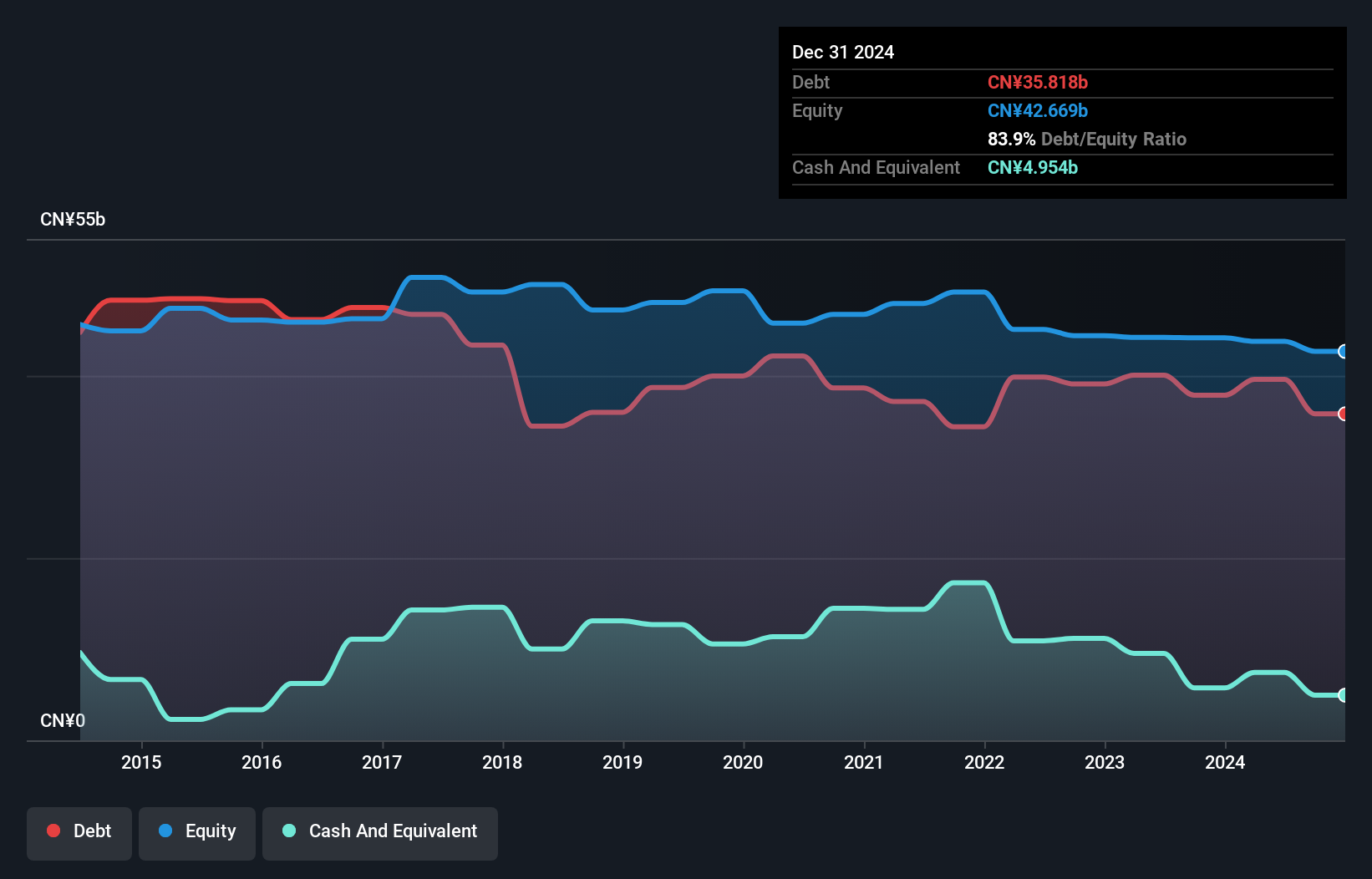Warren Buffett famously said, 'Volatility is far from synonymous with risk.' When we think about how risky a company is, we always like to look at its use of debt, since debt overload can lead to ruin. We can see that Shui On Land Limited (HKG:272) does use debt in its business. But is this debt a concern to shareholders?
Why Does Debt Bring Risk?
Debt and other liabilities become risky for a business when it cannot easily fulfill those obligations, either with free cash flow or by raising capital at an attractive price. If things get really bad, the lenders can take control of the business. However, a more common (but still painful) scenario is that it has to raise new equity capital at a low price, thus permanently diluting shareholders. Of course, debt can be an important tool in businesses, particularly capital heavy businesses. The first step when considering a company's debt levels is to consider its cash and debt together.
What Is Shui On Land's Net Debt?
As you can see below, Shui On Land had CN¥35.8b of debt at December 2024, down from CN¥37.8b a year prior. However, it does have CN¥4.95b in cash offsetting this, leading to net debt of about CN¥30.9b.

How Strong Is Shui On Land's Balance Sheet?
According to the last reported balance sheet, Shui On Land had liabilities of CN¥17.7b due within 12 months, and liabilities of CN¥31.6b due beyond 12 months. Offsetting these obligations, it had cash of CN¥4.95b as well as receivables valued at CN¥12.1b due within 12 months. So its liabilities outweigh the sum of its cash and (near-term) receivables by CN¥32.3b.
This deficit casts a shadow over the CN¥5.28b company, like a colossus towering over mere mortals. So we definitely think shareholders need to watch this one closely. At the end of the day, Shui On Land would probably need a major re-capitalization if its creditors were to demand repayment.
Check out our latest analysis for Shui On Land
In order to size up a company's debt relative to its earnings, we calculate its net debt divided by its earnings before interest, tax, depreciation, and amortization (EBITDA) and its earnings before interest and tax (EBIT) divided by its interest expense (its interest cover). This way, we consider both the absolute quantum of the debt, as well as the interest rates paid on it.
With a net debt to EBITDA ratio of 7.3, it's fair to say Shui On Land does have a significant amount of debt. But the good news is that it boasts fairly comforting interest cover of 2.6 times, suggesting it can responsibly service its obligations. The good news is that Shui On Land improved its EBIT by 7.2% over the last twelve months, thus gradually reducing its debt levels relative to its earnings. The balance sheet is clearly the area to focus on when you are analysing debt. But it is Shui On Land's earnings that will influence how the balance sheet holds up in the future. So if you're keen to discover more about its earnings, it might be worth checking out this graph of its long term earnings trend.
Finally, a company can only pay off debt with cold hard cash, not accounting profits. So it's worth checking how much of that EBIT is backed by free cash flow. Looking at the most recent three years, Shui On Land recorded free cash flow of 42% of its EBIT, which is weaker than we'd expect. That weak cash conversion makes it more difficult to handle indebtedness.
Our View
On the face of it, Shui On Land's net debt to EBITDA left us tentative about the stock, and its level of total liabilities was no more enticing than the one empty restaurant on the busiest night of the year. But on the bright side, its EBIT growth rate is a good sign, and makes us more optimistic. We're quite clear that we consider Shui On Land to be really rather risky, as a result of its balance sheet health. For this reason we're pretty cautious about the stock, and we think shareholders should keep a close eye on its liquidity. There's no doubt that we learn most about debt from the balance sheet. But ultimately, every company can contain risks that exist outside of the balance sheet. For example Shui On Land has 4 warning signs (and 1 which is significant) we think you should know about.
Of course, if you're the type of investor who prefers buying stocks without the burden of debt, then don't hesitate to discover our exclusive list of net cash growth stocks, today.
New: Manage All Your Stock Portfolios in One Place
We've created the ultimate portfolio companion for stock investors, and it's free.
• Connect an unlimited number of Portfolios and see your total in one currency
• Be alerted to new Warning Signs or Risks via email or mobile
• Track the Fair Value of your stocks
Have feedback on this article? Concerned about the content? Get in touch with us directly. Alternatively, email editorial-team (at) simplywallst.com.
This article by Simply Wall St is general in nature. We provide commentary based on historical data and analyst forecasts only using an unbiased methodology and our articles are not intended to be financial advice. It does not constitute a recommendation to buy or sell any stock, and does not take account of your objectives, or your financial situation. We aim to bring you long-term focused analysis driven by fundamental data. Note that our analysis may not factor in the latest price-sensitive company announcements or qualitative material. Simply Wall St has no position in any stocks mentioned.
About SEHK:272
Shui On Land
An investment holding company, develops and sells properties in the People’s Republic of China.
Slight risk with imperfect balance sheet.
Similar Companies
Market Insights
Community Narratives




